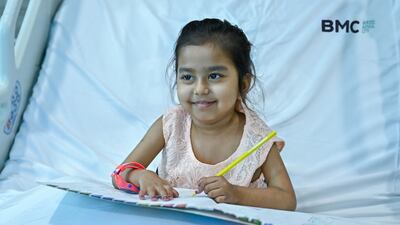A devoted father in the UAE has shared his experience after donating part of his liver to help his four-year-old daughter beat a rare genetic condition that claimed the life of another of his children.
Imran Khan, 40, who lives in Abu Dhabi, said his family feared they would lose Razia to progressive familial intrahepatic cholestasis type 3, a liver disorder that affects only about one in 100,000 people around the world.
It presents in early childhood and causes progressive liver disease, which often leads to liver failure.
Mr Khan knew only too well the stark realities of the condition after the death of Shaima, who was also four, in 2019.
A transplant was the only option available and the family initially planned for the surgery in their native India when Razia was diagnosed, before learning of the prohibitive costs of up to Dh1 million.
Mr Khan contacted Emirates Red Crescent, the charitable arm of the UAE government, for support.
He was told Burjeel Medical City in Abu Dhabi would conduct the crucial procedure for free, in what is being described as the first such pediatric transplant in the Emirates.
Father's despair
“Having lost one daughter to the same condition, every day was filled with fear,” said Mr Khan, who has lived in the UAE for 14 years.
“I wasn’t sure what would happen. Every day I was afraid of losing her.”
Mr Khan immediately came forward to be his daughter's donor after he was found to be a match.
“We didn’t explore any donors from outside, although many in our family were willing to step forward.
“I was found to be a match, and as a father, I decided to do this for my child,” he said.
“It felt really good to donate to your child.”
The transplant team at Burjeel conducted simultaneous donor and recipient surgeries on May 29, which lasted 12 hours.
During such transplants, surgeon's replace part of the diseased organ with a healthy section of liver from the living donor.
The living donor's liver will grow back to normal size soon after surgery, while the section of liver received will also grow to normal size within the body.
Living donor transplants are less common than those involving deceased donors.
Razia was discharged from hospital on June 24 and is now recovering well at home after being given the hope of a better future.
What is the rare liver condition?
Dr Rehan Saif, director of transplant surgery for Burjeel's abdominal Multi-Organ Transplant Programme, explained the genetic disorder.
“Razia’s condition is caused by a genetic mutation, leading to an abnormality in the formation and secretion of bile components and bile acids, ultimately damaging the liver,” Dr Saif said.
“It presents in infancy and early childhood as signs of growth failure and complications of liver failure.
“The only definitive and curative treatment for these children is liver transplantation.”
There are three known types of progressive familial intrahepatic cholestasis, labelled types 1 to 3.
Patients with the first two forms of the condition can present with various symptoms, including deafness, diarrhoea and inflammation of the pancreas.
But those with type three demonstrate only symptoms related to liver disease.
Landmark surgery
Dr Saif said the paediatric liver transplant was a significant step for the country's healthcare sector.
“This is a monumental achievement for the UAE’s medical community,” he said.
“It ensures that children like Razia can receive life-saving treatments without the need to travel abroad.
“We are proud to have reached this milestone and look forward to helping more families in the future.”
Dr Saif said Razia was making “an excellent recovery from her life-saving liver transplant and will be on regular follow-up”.
“Her physical and intellectual development will return to normalcy with an improved quality of life,” he said.
“She will be able to start school and enjoy her childhood like any other child her age.”
Her father spoke of his delight at her improvement.
“I've never seen Razia's eyes not being yellow. Now they are clear, and she is growing.
“Now that the surgery is done and we are recovering, at least there is no risk any more.”

